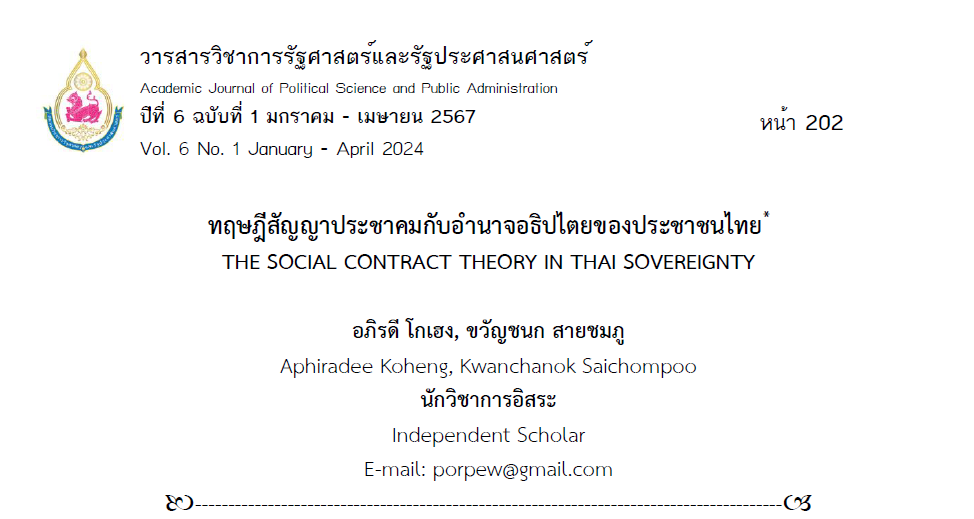ทฤษฎีสัญญาประชาคมกับอำนาจอธิปไตยของประชาชนไทย
คำสำคัญ:
ทฤษฎีสัญญาประชาคม, อำนาจอธิปไตย, ประชาชนไทยบทคัดย่อ
บทความชิ้นนี้เป็นการวิเคราะห์ทฤษฎีการเมืองแนวสัญญาประชาคมของนักคิดสามท่านนั่นก็คือ จอห์น ล็อค (John Locke) โธมัส ฮ้อบส์ (Thomas Hobbes) และฌอง ฌากส์ รุสโช (Jean Jacques Rousseau)
โดยบทความนี้จะวิเคราะห์ทฤษฎีสัญญาประชาคมของบุคคลทั้งสามในบริบทอำนาจอธิปไตยของประชาชนไทย ซึ่งจากการศึกษาพบว่า สาระสำคัญของทฤษฎีสัญญาประชาคมของทั้งสามท่านเหมือนกันในข้อที่ว่า “รัฐบาลเป็นผลมาจากสัญญาของประชาชน” โดยเริ่มจากจุดเริ่มต้นเดียวกันคือ ระดับปัจเจกบุคคล นั่นคือการเกิดรัฐและความสัมพันธ์ของปัจเจกบุคคลและรัฐ เมื่อมองในบริบทของอำนาจอธิปไตยของประชาชนไทย จะเห็นว่าอำนาจอธิปไตยทางการเมืองมีความสำคัญมาก เพราะเป็นการแสดงออกที่อำนาจอธิปไตยทางการเมืองของประชาชน โดยการแสดงออกในการมีส่วนร่วมของประชาชนในการเมือง ไม่ว่าจะเป็นสิทธิในการเลือกตั้ง สิทธิในการออกเสียงประชามติ สิทธิในการเสนอร่างกฎหมาย สิทธิในการถอดถอนในเรื่องสำคัญ ๆ เป็นต้น
เอกสารอ้างอิง
สำนักงานเลขาธิการสภาผู้แทนราษฎร. (2561). การมีส่วนร่วมทางการเมืองในระบอบประชาธิปไตย. กรุงเทพฯ: กลุ่มงานผลิตเอกสาร สำนักประชาสัมพันธ์ สำนักงานเลขาธิการสภาผู้แทนราษฎร.
ไสว เหว่าไว. (2544). ปัญหากฎหมายเกี่ยวกับการปฏิบัติหน้าที่ของวุฒิสภา (วิทยานิพนธ์นิติศาสตรมหาบัณฑิต สาขาวิชากฎหมายมหาชน). กรุงเทพฯ: มหาวิทยาลัยรามคําแหง.
Fred, D’A. & Gerald, G. (2001). Contemporary Approaches to the Social Contract. Stanford Encyclopedia of Philosophy. Stanford: Stanford University.
Hobbes, T. (1985). 1651a. Leviathan. C.B Macpherson (Editor). London: Penguin Books.
Locke, J. (2003). Two Treatises of Government and A Letter Concerning Toleration. New Haven: Yale University Press.
Rousseau, J. (1987). The Basic Political Writings (Trans. Donald A. Cress) Indianapolis: Hackett Publishing Company.

ดาวน์โหลด
เผยแพร่แล้ว
รูปแบบการอ้างอิง
ฉบับ
ประเภทบทความ
หมวดหมู่
สัญญาอนุญาต
ลิขสิทธิ์ (c) 2024 วารสารวิชาการรัฐศาสตร์และรัฐประศาสนศาสตร์

อนุญาตภายใต้เงื่อนไข Creative Commons Attribution-NonCommercial-NoDerivatives 4.0 International License.




